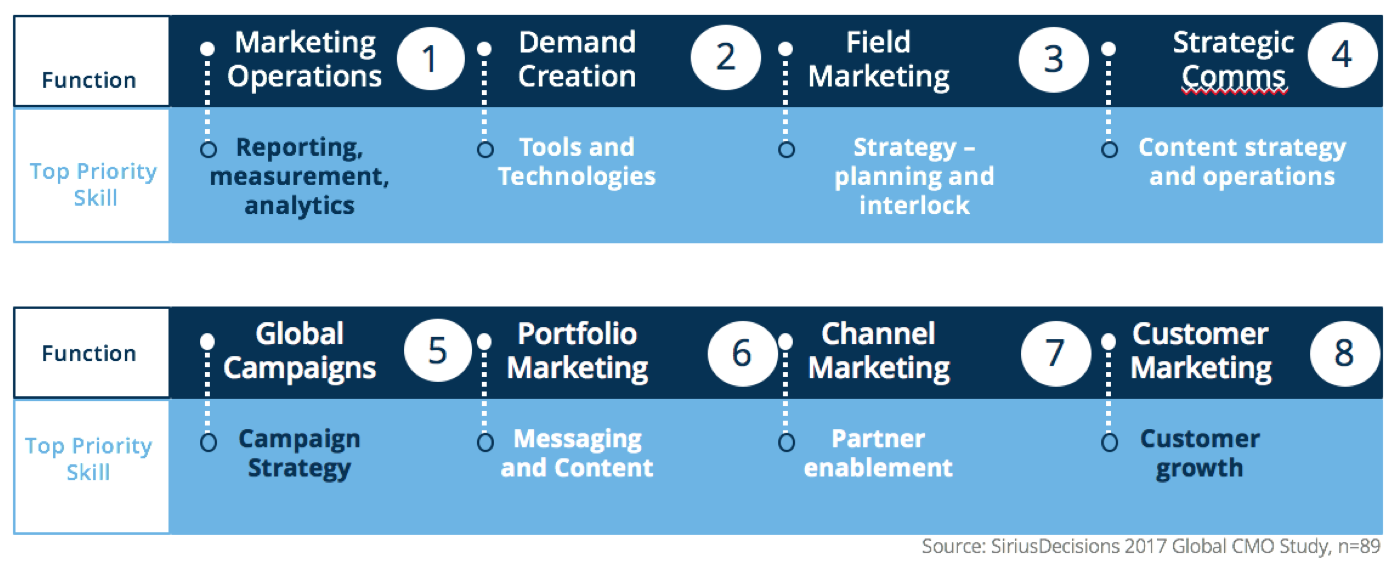CMOs Rank Skills Enhancement for 2018 and Beyond
- CMOs are adding or enhancing B2B marketing skills to help them grow and retain top talent, as well as enable and drive high-performance marketing
- The annual SiriusDecisions Global CMO Study gives B2B marketing leaders a glimpse at what everyone else is doing in the world of B2B marketing, including planned skills enhancements
- Marketing operations is the greatest area for planned skills enhancements, with an emphasis on measurement, analytics and reporting
At some point in our lives we’ve all heard the phrase, “would you jump off a bridge just because everyone else is doing it?” It’s a question intended to make us think about potential dangers or bad influences, but what if knowing what everyone else was doing could be a positive influence? Are there instances when you should jump? As a CMO peer advisor, I know that my livelihood depends on sharing insights about what B2B marketing organizations are doing and plan to do – and then helping CMOs know whether they should do the same.
SiriusDecisions’ annual global CMO study gives B2B marketing leaders an opportunity to look at what everyone else is doing in of B2B marketing, including planned skills enhancements. Marketing leaders have a keen interest in knowing where other CMOs are focused on adding or enhancing skills across their teams to help them grow and retain top talent, and enable and drive high-performance marketing.

Of the almost 300 global marketing leaders who participated in this year’s study, 75 percent of them indicated a plan to enhance the skills across their team over the next two years, and 44 percent of them ranked enhancing skills as the number one organizational priority. We presented them with a list of essential B2B marketing skills and asked them to identify the skills they planned to enable or enhance.
Because the best approach to developing a marketing enablement plan for up-leveling or adding skills is to identify specific skill requirements by function, we grouped the skills selected by functional area to tally the results. The ranking below reflects the number of skills selected within a functional area from highest to lowest. There were five or six essential skills to choose from within each area. The skills represented below reflect the highest ranking within each function.
In addition, we looked at the highest ranked skills across all functional areas and found the top three skills (irrespective of functional area) are:
- Reporting, measurement and analytics, and campaign strategy are tied for the top spot. Today, organizations rely heavily on their marketing teams to support decisionmaking with reliable customer data, insights and analysis. To do so requires competencies in the areas of measurement, analytics and reporting. While some of these competencies exist in many marketing operations functions, most organizations are striving to develop more advanced skills in this area. Equally important to marketing leaders is the development of an integrated campaign strategy that addresses the needs of the targeted buyers and facilitates their decisionmaking process to purchase with the right balance of reputation, demand creation, sales enablement, and market intelligence programs, which require skills that cut across all of these areas. In fact, the two skills areas are connected because the market intelligence programs within a campaign depend on the measurement, analytics and reporting skills.
- Customer growth. CMOs are increasingly focused on marketing’s role in customer engagement to drive growth. Organizations may have separate teams for customer experience, customer marketing and customer success, or teams that share responsibilities across one or more of these areas. Customer marketing plays a key role by enabling engagement, loyalty, advocacy and retention in the customer base. Historically, the responsibility for marketing to the customer base was lumped with other functions and/or included a set of disjointed activities. CMOs are realizing that true customer marketing requires a unique set of skills and creating discrete customer marketing teams and equipping them with the skills required to do the job.
- Marketing planning and marketing technology are tied for third place. These are skills that we include within the marketing operations function. They don’t appear in the infographic below because they weren’t the highest-ranking ones within the marketing operations function. However, if we look at the ranking of skills across all functions, they become the third highest ranking. Last year’s CMO study revealed a renewed focus on enhancing the marketing planning process, so it comes as no surprise that this year’s data tells us there is a need to enhance the skills to support that process. Effective planning requires an understanding of how to translate corporate growth objectives into a marketing strategy and plan that ensures marketing can achieve the expected contribution to business goals. The need for technology skills connects directly to the top skills priorities. Technology enables data-driven marketing and effective execution of the campaign strategy. But the benefits of a marketing technology stack can’t be fully realized without the right skills to utilize them.

Should you jump to add or enhance these skills too? Maybe. The needs of your organization are unique, and requirements vary by the maturity levels of the teams within your marketing function. Preparing to jump requires taking the following steps.
- Understand B2B marketing trends and dynamics and their implications (e.g. continuing to read SiriusPersectives blogs!)
- Take stock of the competencies required to support the expected contribution to your organization’s growth strategies
- Assess the current state to identify the gaps that need to be addressed to optimize performance
- Develop your strategic skill enhancement plan for 2018
In this instance, following others and jumping off the “skills bridge” won’t lead to any potential dangers. SiriusDecisions data has shown that transforming skills improves employee engagement, and it can lead to significant increases in revenue contribution and productivity.
